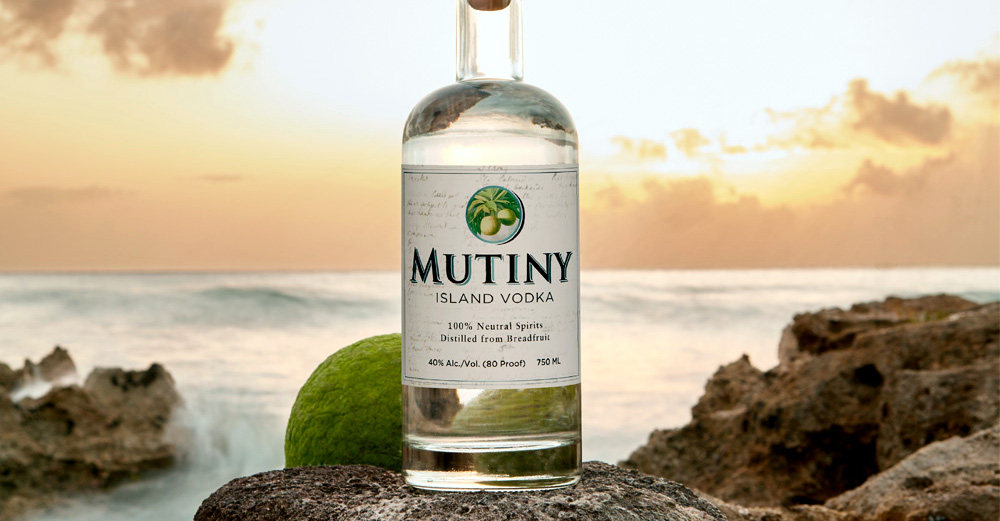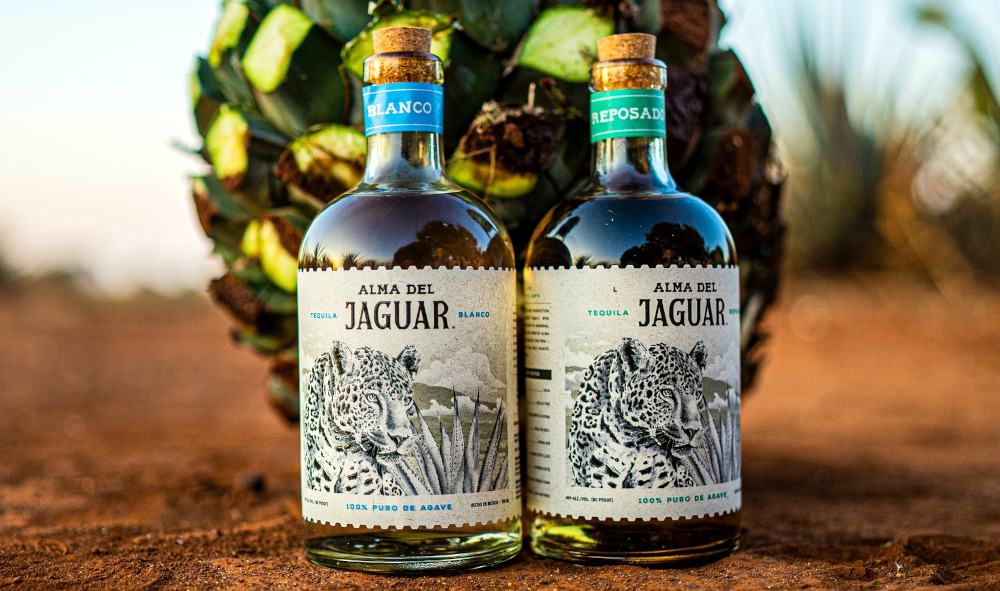More and more liquor brands are raising the bar for sustainable spirits: Companies
including Bombay
Sapphire
and Maker’s
Mark
are leading major players by example; while smaller distillers are
setting new standards for sustainable
rum,
gin
and
whiskey
and turning waste from tequila production into everything from
flour
to
bricks.
Now, two younger spirits brands are making a mark through business models built
around nature conservation.
Mutiny Island Vodka
 Image credit: Mutiny Island Vodka
Image credit: Mutiny Island Vodka
For Mutiny Island Vodka, based on
the US Virgin Island of St. Croix, it’s about its primary ingredient and
giving it more exposure to ultimately protect it.
“Our basic premise was that breadfruit is a criminally underused resource, and
we wanted to incentivize it by planting it,” founder Todd
Manley told Sustainable
Brands® (SB).
Manley, an award-winning chef and
restaurateur, started Mutiny Island
in 2017 with a laser-focus on using every part of the breadfruit — a tree-bound,
versatile superfood with a spiky exterior and starchy interior. It is thought
that breadfruit came to the Caribbean from the South Pacific sometime in
the late 1700s and flourished in the similar growing climate.
Manley created what the company calls “a perfect
distillation” of breadfruit and
Caribbean rainwater in a process that’s essentially zero waste — using all parts of the
breadfruit and sending spent portions post-distilling to local farms to use as
livestock feed. The byproduct is what Manley calls a “nutrient-dense” water from
which the feed can be separated before returning the water back into the ground.
Breadfruit has been having a small resurgence, mainly for its carbon-capture
potential and resilience in the face of climate
change.
Not only does breadfruit thrive in warmer climates — it also enriches
biodiversity with a quick growing cycle of 1-2 years in places that often need
suitable, investable agriculture such as those in tropical areas.
Manley says that the company could produce as many as two million bottles a year
at the St. Croix facility, but as of now are only at about 10 percent of that.
He expects production to grow as awareness around the fruit’s benefits continues
to grow.
“We are a premium product; but we don’t price it like that, because we want
everyone to taste it,” he says.
Alma del Jaguar Tequila
 Image credit: Alma del Jaguar
Image credit: Alma del Jaguar
Meanwhile, in 2022, in another warm region of North America, spirits
entrepreneur McCauley
Williams — then-CEO of
B.R. Distilling Company, maker of Blue Note
Bourbon and Riverset Rye — shifted his focus from whiskey to tequila,
inspired by his uncle’s mission to save endangered jaguars along the
US/Mexico border.
“I wanted to do something with a bigger brand mission, and a light bulb went
on,” he told SB.
That year, he founded Morningside Brands to build a mission-based portfolio
of spirits that are handcrafted, sustainably produced, and developed to raise
awareness and impact for selected causes; then, in May 2023, he launched its
first brand, Alma del Jaguar Tequila — whose
mission is to protect Jaguars through donations to and awareness of his uncle’s
Northern Jaguar Project. Much of the
area’s jaguar habitat overlaps with areas that foster agave; and although the
company has already donated $30,000 in proceeds to the non-profit, Williams
quickly discovered that his spirits project opened up a much larger conversation
— about the complexities of an American entrepreneur working with local Mexican
purveyors against the backdrop of the border debate.
“Tequila allows people to talk about the border in a more casual setting. It’s
changed my perspective of Mexico completely,” he says.
He says he’s been fortunate to have only positive experiences working with his
Mexican counterparts, and that bringing Alma to life has given him new
appreciation that the border crisis is as much an environmental issue as it is a
social issue.
“There’s just a whole other dynamic of politics and a sense of national pride
that’s different from how we perceive it here,” he adds.
Another way Alma deviates from other tequila brands is a firm commitment to
produce everything close to the source, including its packaging. Even with a
16-18 percent material premium, Williams found it made more sense to source a
bottle, cap, box and label all produced within 85 miles of the distillery —
primarily because of the area’s reputation as a manufacturing hub. It reduces
his logistics costs and builds a direct connection with local Mexican
manufacturers.
“If you do things the right way, you find all these ergonomic efficiencies that
also do good for the bottom line,” he says.
He also made a commitment to stick to a pure, unfiltered product free from any
additives that he says are in “95 percent” of tequilas and leads to many cases
of “mislabeling.”
Above all, Williams says that he’s learning that you don’t have to sacrifice to
become a mission-driven, environmentally focused spirits brand; and it’s
something he wants to challenge others to realize, as well.
“The mission here isn’t to be the only one,” he says. “We want everyone else to
do it, too.”
Get the latest insights, trends, and innovations to help position yourself at the forefront of sustainable business leadership—delivered straight to your inbox.
Geoff is a freelance journalist and copywriter focused on making the world a better place through compelling copy. He covers everything from apparel to travel while helping brands worldwide craft their messaging. In addition to Sustainable Brands, he's currently a contributor at Penta, AskMen.com, Field Mag and many others. You can check out more of his work at geoffnudelman.com.
Published Apr 9, 2024 8am EDT / 5am PDT / 1pm BST / 2pm CEST